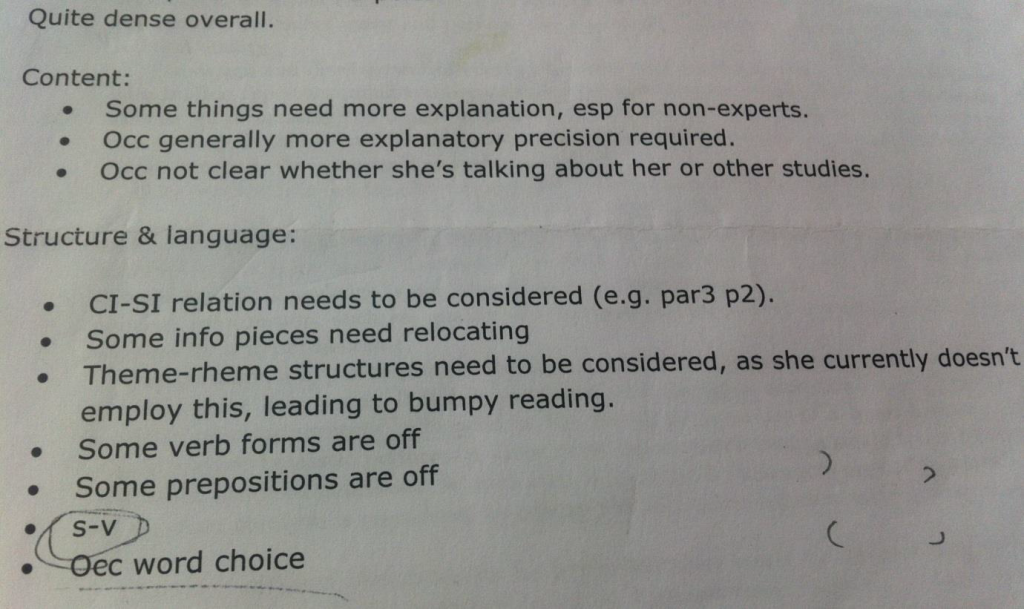November 6, 2015, by International students
Dealing with English writing: CELE consultation
As an overseas student whose first language is not English, I found that writing, especially in academia, was not an easy job. In UK universities, most courses give essay assignments. I saw that some people have been used to writing since they were a child, which is good because in my opinion, writing also builds critical thinking.
It was different for me, as I spent formal education mostly learning science (especially mathematics), but spent less time writing. Writing blog posts help you to train your writing skills, like what I do now. Nevertheless, in academia, you need to write ideas in a well-structured way. Sometimes you have everything in mind, but when it is time to deliver the ideas on a piece of paper, suddenly your brain is frozen and you get hand cramps.
How to overcome this problem? Some students, including me, take an English writing course. There are some of them, such as Academic Writing: Grammatical Accuracy, Achieving Clarity, Synthesising Sources, and Planning an Assignment. I have joined Research Writing in my first year of study. They are available at Centre for English Language Education (CELE) in-sessional. These courses are free for students at The University of Nottingham and very useful. You will note some errors in writing that you have not realized before. These courses will give you a full-pack of guidance and exercises to improve your writing. The materials are available both in hardcopy which can be collected at class, and softcopy which you can find at Moodle. For a first semester, student only can take up to 3 CELE courses. However, based on my experience, focused on only one in fact helped me to take a full use of the course. Students usually have a bunch of activities and first semester sometimes make you greedy to try everything, but I prefer quality than quantity.
Is it exactly everything you need to improve your writing skills? I say no, because the best teacher is learning by doing, which means you need to write. Write everything, write every day. The good thing about CELE is that the tutor encourages you to also practice after the class, then you can bring your writing to discuss at the next meeting. Moreover, the most important thing is to know your stage in writing skill. To assess, you need feedback. I think most international students have their first writing feedback from an IELTS test. When was the last time you took IELTS or another writing assessment? The answer is important. I even made the same mistake in my second draft of my report, because I got the feedback a long time ago and did not directly implement it in practice.
Actually, there’s nothing to be worried about if it has been a while since the last time you wrote an English article. As a student at The University of Nottingham, I am so glad that we have a CELE consultation. You will have a 30 minutes face-to-face discussion with a tutor by sending up-to 1000 words via email two days before. It is not a proof reading, instead the tutor will give a suggestion about content, structures and use of language that you need to give careful attention to. When I took CELE consultation, there were some points of the feedback that I did not understand, then the CELE tutor gave me an example in sentence. In addition, providing examples in writing help to achieve clarity. Previously, I could not find-out in details, what were particular difficulties that I faced in academic writing, until I took CELE consultation. It used to leave me with a feeling of hesitation when I needed to do rewording for my report: considering whether I have made a better – well written – sentence or not.
So it is true that this consultation, up-to 3 times per term, is capable of helping students become their own proof reader. One tip is to book at the beginning of the term since it is fully booked fast. Here is an example of the feedback.
Some websites which could be useful for writing are :
1. www.lextutor.ca/conc/eng
2. www.webcorp.org.uk/live
3. www.nottingham.ac.uk/alzsh3/acvocab
4. www.uefap.com
5. www.fraze.it
6. www.collinsdictionary.com
To sum up, make writing become a fun activity and habit that you enjoy, so that one word will not be a burden and one sentence will not be a pain. Write to be read, not to be important. Write to express, not to impress.
Thank you CELE!
Raras Tyasnurita, International student from Indonesia, PhD student at School of Computer Science at The University of Nottingham.



 English
English
it’s really hard for me . I found http://www.lextutor.ca/conc/eng useful and easy to use for training. thank you for sharing